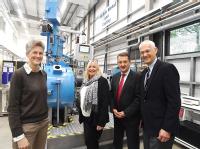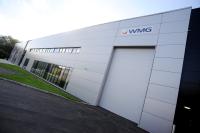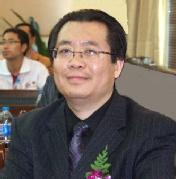Departmental news
Supporting the steel industry at WMG
 Businesses of all sizes in Coventry and Warwickshire can take advantage of a state-of-the-art facility to develop the next generation of lightweight steel products.
Businesses of all sizes in Coventry and Warwickshire can take advantage of a state-of-the-art facility to develop the next generation of lightweight steel products.
WMG (Warwick Manufacturing Group) at the University of Warwick has created a cutting-edge research, design and skills infrastructure zone in its Advanced Manufacturing and Materials Centre.
Its work is focused on supporting the development of new lightweight steel products as well as building an environment to develop the next generation of experts in this specialist field and can be accessed by SMEs as well as global businesses.
The three-year project has received £1 million of funding from the Government’s Local Growth Fund through the Coventry and Warwickshire Local Enterprise Partnership (CWLEP) to buy key R&D equipment and a further £1 million from WMG which includes industry funding.
Neutron beam from nuclear reactor used to produce safer cars
A partnership led by WMG at the University of Warwick, with the Institut Laue-Langevin (ILL), Tata Steel, and the Engineering and Physical Science Research Council (EPSRC) is using a stream of neutrons from ILL’s nuclear reactor in a new project to examine the safety critical welds in cars made with boron steel.
Press-hardened boron steel is an ultra high-strength steel used across a variety of industries, with a particularly important application in the automotive industry. A large proportion of car manufacturers use boron steel for structural components and anti-intrusion systems in automobiles, as it provides high strength and weight-saving potential, allowing for stronger yet lighter cars, with increased passenger safety.
In the automotive industry, a major joining method for boron steel components is “resistance spot welding”, with several thousand welds being made on a single car. Spot welding exposes the boron steel sheet directly underneath the electrodes” to very high temperatures, causing the metal to exceed melting temperature and then rapidly solidify upon cooling. This results in a heat-affected zone, where surrounding material contracts and its microstructures are altered.
Lightweight steel production breakthrough: brittle phases controlled
Dr Alireza Rahnama has developed a new processing route which allows low density steel-based alloys to be produced with maximum strength, whilst remaining durable and flexible– something which has been largely impossible until now.
Two lightweight steels were tested - Fe-15Mn-10Al-0.8C-5Ni and Fe-15Mn-10Al-0.8C – for their potential to achieve maximum strength and ductility.
During production, two brittle phases can occur in these steels: kappa-carbide (k-carbide) and B2 intermetallic – which make the steels hard but limits their ductility, so they are difficult to roll.
Institute of Corrosion award presented to WMG’s Dr Michael Auinger
 Dr Auinger’s paper entitled ‘Grain boundary oxidation in iron-based alloys investigated by O enriched water vapour – The effect of mixed oxides in binary and ternary systems,’ has been awarded the TP Hoar Award 2016, by the Institute of Corrosion.
Dr Auinger’s paper entitled ‘Grain boundary oxidation in iron-based alloys investigated by O enriched water vapour – The effect of mixed oxides in binary and ternary systems,’ has been awarded the TP Hoar Award 2016, by the Institute of Corrosion.
The award takes its name from Dr Hoar who was the first recipient of the UR Evans Award – the premier scientific award of the Institute of Corrosion. The TP Hoar Award essentially recognises the Best Paper in Corrosion Science amongst engineers and scientists in steels processing.
This award marks a very successful period for Dr Auinger. In September he also received recognition from the European Optical Society (EOS), scooping the prestigious Best Paper Prize 2014-2015.
WMG PhD student receives international acclaim
 Kateryna Hechu, the lead author of a research paper entitled ‘Real-Time Measurement of Contraction Behaviour of Peritectic Steels During Solidification,’ has, along with her co-authors been awarded the prestigious 2017 Jerry Silver Award by The Association of Iron and Steel Technology (AIST).
Kateryna Hechu, the lead author of a research paper entitled ‘Real-Time Measurement of Contraction Behaviour of Peritectic Steels During Solidification,’ has, along with her co-authors been awarded the prestigious 2017 Jerry Silver Award by The Association of Iron and Steel Technology (AIST).
AIST represents an international network of steel industry knowledge and expertise. It is a non-profit organisation with 17,500 members from more than 70 countries.
The Jerry Silver award is presented to the author of a process metallurgy or product applications technical paper judged to be the ‘best of class’ by the AIST Metallurgy – Processing, Products and Applications Technology Committee. One of the authors must be a student.
UK steel production to benefit from efficiency innovation
Steel production in the UK could be cheaper and more energy-efficient in the future, thanks to research at WMG, University of Warwick.
The ASSURE2 project, led by Professor Claire Davis, is looking to significantly cut steel production costs,  and reduce energy consumption by over 300%, through exploring the use of belt casting technology.
and reduce energy consumption by over 300%, through exploring the use of belt casting technology.
Belt casting is a significantly lower energy production route compared to traditional continuous casting techniques, as belt casting is a near net shape casting process, producing strip that needs minimal hot deformation to achieve the required product thickness.
It is also very efficient because it can minimise or eliminate any reheating processes, which reduces overall costs.
Furthermore, there are certain advanced high strength strip (AHSS) steel grades which are commercially attractive but cannot be produced using conventional casting techniques - which could be manufactured using belt casting.
New million pound Coventry and Warwickshire Hub for developing advanced lightweight metals
WMG, at the University of Warwick, will be building on its reputation in materials research, as it is set to be a hub for the development and application of advanced lightweight metals, thanks to a £1m Growth Deal award from the Coventry and Warwickshire Local Enterprise Partnership (CWLEP).
for the development and application of advanced lightweight metals, thanks to a £1m Growth Deal award from the Coventry and Warwickshire Local Enterprise Partnership (CWLEP).
The award will create a local network of knowledge, equipment and skills – supporting WMG to share its expertise on steels and other advanced materials with companies in the CWLEP area, enabling them to exploit emerging technologies and new materials grades. In particular, those based on metallic materials and their effective forming and joining, often in combination with other materials.
The deal will fund new capital equipment, to be in WMG’s Advanced Steels Research Centre, based in the Advanced Materials and Manufacturing Centre, which combined with WMG’s leading R&D capabilities will give local companies, in particular SMEs, the ability to introduce new market-leading products, improve the performance of existing products and introduce weight and/or cost saving in products.
WMG’s Dr Michael Auinger receives European acclaim
 Dr Auinger’s report on ‘Effects of surface roughness on optical heating of metals’ has been awarded the esteemed Best Paper Prize 2014-2015, by the European Optical Society (EOS).
Dr Auinger’s report on ‘Effects of surface roughness on optical heating of metals’ has been awarded the esteemed Best Paper Prize 2014-2015, by the European Optical Society (EOS).
Dr Auinger, who co-wrote the report and has been described as the main ‘driving force’ behind it, said: “The EOS is celebrating its 25th anniversary this year, which makes this award extra special. It was a great surprise, and I feel totally honoured to receive such acclaim.”
The search for stable materials during fast temperature changes or thermal cycling conditions is one of the biggest challenges in modern alloy design. Dr Auinger conducted his research over a six month period with colleagues from Germany at the Max-Planck-Institut für Eisenforschung in Düsseldorf and SENTECH Instruments in Berlin.
Alloy oxidation breakthrough could cut steel production losses
 New strategies of making steel production more efficient have been discovered, thanks to research led by WMG at the University of Warwick on the role of oxidation during alloy additions.
New strategies of making steel production more efficient have been discovered, thanks to research led by WMG at the University of Warwick on the role of oxidation during alloy additions.
The research, led by Dr Michael Auinger of WMG, together with the Vienna University of Technology (Austria) and voestalpine Stahl GmbH (Austria) developed a better understanding for the oxidation behaviour inside steels during hot rolling, which could potentially help manufacturers to reduce the amount of steel lost during production.
Dr Auinger and his co-researchers analysed the oxidation behaviour of different iron-based alloys. They found that particularly the combinations of iron-manganese and a second alloy addition - representing a simplified version of many high strength steels in automotive - suffer from severe oxide formation along grain boundaries if these alloys are processed in an inappropriate manner.
World-Renowned Steels Professor Shares Expertise
 WMG is delighted to welcome Professor Zhang, who will be working alongside Professor Sridhar Seetharaman’s world-class Steels Processing Research Team, as part of a special month-long stay.
WMG is delighted to welcome Professor Zhang, who will be working alongside Professor Sridhar Seetharaman’s world-class Steels Processing Research Team, as part of a special month-long stay.
Professor Zhang, is an admired expert in the field of iron and steel manufacturing, especially for clean steel and modelling for process metallurgy, and is normally based at the School of Metallurgical and Ecological Engineering, at the University of Science and Technology in Beijing.
